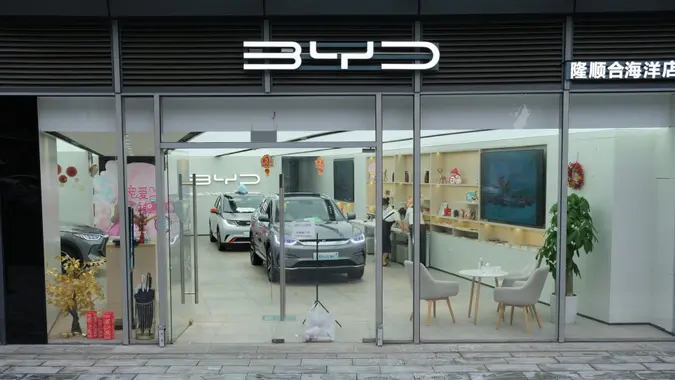6 Electric Vehicle Brands That Rival Tesla but Aren’t Tied to Elon Musk

Commitment to Our Readers
GOBankingRates' editorial team is committed to bringing you unbiased reviews and information. We use data-driven methodologies to evaluate financial products and services - our reviews and ratings are not influenced by advertisers. You can read more about our editorial guidelines and our products and services review methodology.

20 Years
Helping You Live Richer

Reviewed
by Experts

Trusted by
Millions of Readers
Tesla has dominated the electric vehicle (EV) market for years, providing consumers with a wide range of models, although it hasn’t followed through with an affordable option for the average American driver yet. Meanwhile, new electric-only companies and long-standing “traditional” internal combustion engine automakers are providing more options, making EVs more accessible to a wider audience.
Recent car sales and share price drops in response to Elon Musk’s political and physical stances have hit Tesla hard, prompting J.P. Morgan analysts to declare, “We struggle to think of anything analogous in the history of the automotive industry, in which a brand has lost so much value so quickly,” per Forbes.
Many drivers both in the U.S. and elsewhere are distancing themselves from Musk and Tesla due to his political leanings and polarizing behavior, but there’s no shortage of other EVs to consider, from conventional internal combustion engine brands to all-electric makers that offer a wide variety of models and starting prices.
Here are six alternatives to Tesla, starting with the world’s largest electric vehicle producer.
Also see eight electric cars to avoid buying.
BYD
BYD surpassed Tesla’s production numbers in 2024, but by only around 5,000 units. The Shenzhen-based company BYD (Build Your Dreams) is China’s biggest car brand and the fourth-most-valuable car manufacturer in the world by market cap.
It’s unlikely you’ll see the popular Seal — which compares admirably to the Model 3 — stateside anytime soon, but the company is expanding everywhere else and is Tesla’s main rival.
Mercedes-Benz
Mercedes’ EQE is the No. 1 best luxury electric car, per Kelley Blue Book, and it’s not difficult to see why. In two short years, the German carmaker has adapted to a future dominated by EVs admirably.
Recently, Mercedes threw down the gauntlet to Tesla when it unveiled the forthcoming CLA, which will able to recharge almost half its battery in 10 minutes and drive a staggering 492 miles on a single charge, per Fortune.
Lucid
A viable luxury alternative to Tesla’s Model S Plaid is Lucid’s Air Grand Touring model. This model outperforms and out-styles the S Plaid in many categories.
If you’re looking at base models, U.S. News & World Report rated the Air better in cargo space, interior quality and features, seat comfort, and acceleration. The base Air has better range (406 to 512 miles) and is about $10,000 cheaper than the base Model S.
Hyundai
Hyundai makes superb EVs that cost much less to own than Tesla. Every year, electric models benefit from battery capacity and range upgrades, but Hyundai’s Ioniq 5 rivals Tesla’s popular Model Y in every aspect, especially the N variant, which is built strong for performance.
“We’ve yet to find any indication that Hyundai isn’t a new leader among mainstream electric vehicles,” per MotorTrend.
Rivian
In its most recent reliability rankings, Consumer Reports (CR) placed Rivian dead last out of 22 auto brands. However, the Irvine, California-based manufacturer has topped CR’s customer satisfaction survey the past two years. Rivian owners appreciate the comfort, performance, cargo space and off-road capabilities of its R1S SUVs and R1T pickups.
In fact, 86% of Rivian drivers said they’d buy the same model again, per CR. (Tesla ranked third in this survey, with 72% of owners saying they would buy.)
BMW
Known for luxurious comfort, premium engineering and innovative tech, BMW increased its electric sales by 75% last year, and unlike established brands like GM and Ford, it made a profit on its EVs, according to The New York Times.
Ranging in price from the high $60,000s to mid-$80,000s, the i5 is one of the finest examples of its class and costs less than the similar Tesla Model S. However, its range, while effective (between 239 and 295 miles) falls behind the S considerably (between 312 and 348 miles).
Editor’s note on political coverage: GOBankingRates is nonpartisan and strives to cover all aspects of the economy objectively and present balanced reports on politically focused finance stories. You can find more coverage of this topic on GOBankingRates.com.
More From GOBankingRates
 Written by
Written by  Edited by
Edited by 

























